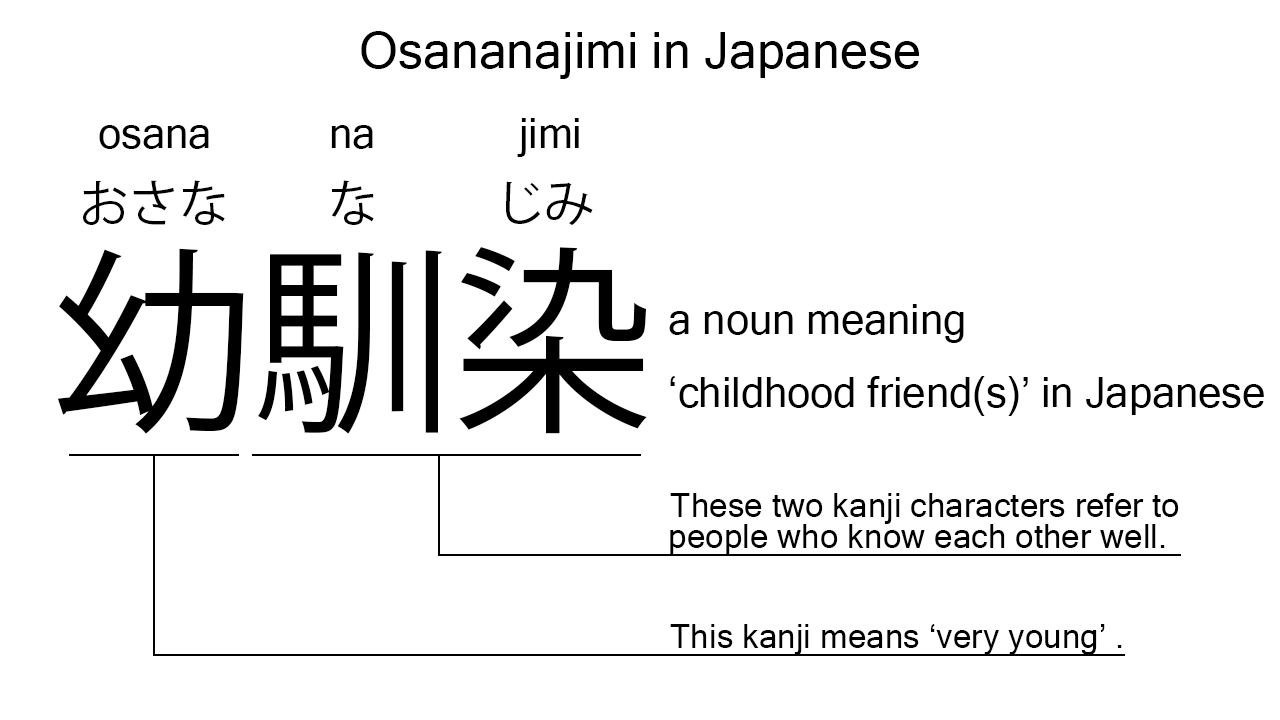What does “osananajimi” mean in Japanese?
Native speakers say “osananajimi” to mean ‘childhood friend’ in Japanese. Perhaps, some Japanese learners know this word as it is sometimes used in Japanese movies, songs, novels, manga, anime, and the like. In this blog post, however, I will explain this word in detail based on its grammatical components. And also, I will explain how to use it through example sentences. My explanations would help Japanese learners understand “osananajimi” more clearly. Then, let’s get started!
Contents
Definition and meaning of “osananajimi”
Let me start with the definition and meaning of “osananajimi”.
- osananajimi – 幼馴染 (おさななじみ) : a noun meaning ‘childhood friend’ in Japanese. This can also work as plural. Learn more about Japanese plural.
This noun doesn’t have a perfect translation in English, but Japanese native speakers normally use this to refer to someone whom they know well since childhood.
The definition and meaning are simple and clear, I think. To understand this noun more clearly, however, let me explain its grammatical components in detail, one by one.
What does “osananajimi” literally mean in Japanese?
“Osananajimi” consists of the following two components:
- osana – 幼 (おさな) : the stem part of the i-adjective, “osanai”, which means ‘very young’ or ‘childish’ in Japanese.
- najimi – 馴染 (なじみ) : a noun referring to people who know each other well.
From these two components, we can understand that “osananajimi” means ‘people who know each other well since they were very young’ in Japanese. This literal interpretation is very close to the actual meaning, I think. Childhood friends are often people who know each other well since they were very young.

When we meet new Japanese words, we should check their components in detail to understand their meanings clearly and deeply. In many cases, grammatical components tell us a lot about the meanings of the words they form. Actually, here, we could get the better understanding of “osananajimi” through the detailed check above.
So far, I’ve explained the definition and meaning of “osananajimi” together with its kanji expression. Then, let me explain how to use it through the example sentences below.
Example #1: how to say “childhood friend” in Japanese
kanojo wa watashi no osananajimi desu – 彼女は私の幼馴染です (かのじょはわたしのおさななじみです)
She is my childhood friend.
Below are the new words used in the example sentence.
- kanojo – 彼女 (かのじょ) : a pronoun meaning ‘she’ in Japanese.
- wa – は : a binding particle working as a case marker or topic marker. In the example, this works after “kanojo” to make the subject in the sentence.
- watashi – 私 (わたし) : a pronoun meaning ‘I’ in Japanese.
- no – の : a case particle used after a noun or pronoun to make its possessive case. In the example, this is used after “watashi” to make its possessive case, “watashi no“, which means ‘my’ in Japanese.
- desu – です : an auxiliary verb used after a noun or adjective to make it polite. Probably, this is well known as a part of Japanese desu form. In the example, this is used after “watashi no osananajimi” to make it sound polite.
This is a typical usage of “osananajimi”. In this example, it works together with the possessive case, “watashi no”, to say “my childhood friend” in Japanese.
Example #2: another usage of “osananajimi”
kodomo tachi mo osananajimi desu – 子供達も幼馴染です (こどもたちもおさななじみです)
Our children are childhood friends, too.
Below are the new words used in the example sentence.
- kodomo – 子供 (こども) : a noun meaning ‘child’ or ‘kid’ in Japanese. This can also work as plural.
- tachi – 達 (たち) : a suffix used after a noun or pronoun to make its plural form. In the example, this is used after “kodomo” to make its plural form, “kodomo tachi”, which means ‘children’ in Japanese.
- mo – も : a binding particle making the subject word or the object word in a sentence with adding the meaning of ‘too’, ‘also’, or ‘as well’. In the example, this works after “kodomo tachi” to make the subject in the sentence with adding the meaning of ‘too’.
This is another typical usage of “osananajimi”. When we want to say “childhood friends” in Japanese, this noun is always a very good option.
Summary
In this blog post, I’ve explained the definition and meaning of “osananajimi” in detail based on its grammatical components. And also, I’ve explained how to use it through the example sentences. Let me summarize them as follows.
- osananajimi – 幼馴染 (おさななじみ) : a noun meaning ‘childhood friend’ in Japanese. This can also work as plural. This noun literally means ‘people who know each other well since they were very young’ in Japanese. This literal interpretation is very close to the actual meaning, I think. Childhood friends are often people who know each other well since they were very young.
Hope my explanations are understandable and helpful for Japanese learners.